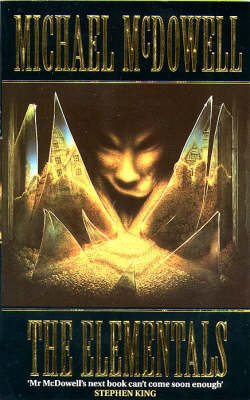
brokentune
Written on Sep 17, 2016
He smiled, remembering in what affection his mother had held the shrill bird— despite its disappointing speechlessness. He raised the cover to peer inside. The parrot flapped its iridescent, blood-red wings and stuck its beak between the bars. Its flat black eye reflected light that was not in the room. For the first time in its eight-year life, the parrot spoke. In cold imitation of Luker McCray’s voice, the parrot cried: “Savage mothers eat their children up!”
What a book! What a creepfest of a book! The Elementals tells the story of the Savage/McCray family who go through the aftermath of a family funeral only to find out that familial grief is the least they need to worry about on their short stay on the Alabama gulf coast.
The family owns two Victorian houses to which they retreat for family gatherings and vacations. There is a third house, however, which overlooks both houses and which seems to have been abandoned and left to the elements.
The dune of white sand— blinding now that the sun shone glancingly off it directly into her eyes— did not merely encroach upon the house, it had actually begun to swallow it.
While The Elementals is first and foremost a work of horror fiction - did I mention that this is creepy? - there is a lot of depth to it that kept me interested far beyond my goal to read this for a bingo challenge.
I am not familiar with McDowell's books and all the way through I wondered whether his portrayal of relationships between the family members was an expression of something more metaphorical than the mere description of the family dynamics. There were a few references to the divide between the different family members that reminded me of other works about the perceived differences between the North and the South, and the perceived "decline" of the South: I say "perceived" because there is a twist in this story, when rationalisation gives way to superstition and tradition. We have Odessa, the family house-keeper, who is described as "Odessa Red, a thin, grim black woman who had been three decades in the dead woman’s employ" when she is introduced, but who later becomes the family's protector and "good" witch, and there are Luker and his daughter India, who left the South and live in New York, and are less prone to give in to superstition than the rest of their family.
"Luker, I’m glad you raised me in New York. Alabama’s weird.”
I'm sure there are other angles to explore with The Elementals, like the rather odd father-daughter relationship between Luker and India, but am still too creeped out to try and re-read different chapters. I'm also still trying to get over the feeling of having sand everywhere, because if nothing else, McDowell's writing managed to create an atmosphere of a hot, humid, beach right wherever I read this.
“Listen, India. Nobody knows about Beldame, and if people find out there are these three perfect Victorian houses down here, they’re going to be out here in droves. Beldame has never been robbed, and I don’t intend to give people any ideas.”
“That’s bullshit,” said India contemptuously. “You’re scared shitless of the third house, that’s all.”
“Of course I am,” said Luker, rolling over with something like anger. “It’s a fucking childhood trauma, and we’ve all got childhood traumas . . .”
“I don’t.”
“Your whole life is a fucking trauma,” said Luker. “You just don’t know it yet. Wait’ll you grow up, then you’ll see how fucked-up you were . . .”
